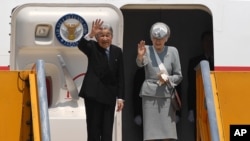Japanese Emperor Akihito paid his respects to the late Thai King Bhumibol Adulyadej on Sunday, arriving in Bangkok following a weeklong trip to Vietnam aimed at winning support against Chinese expansionism.
The monarchies - two of a handful remaining in Asia - have maintained close ties. Bhumibol first visited Japan in 1963, touching off a decades-long friendship with numerous visits back and forth, most recently a visit by Akihito to Thailand in 2006.
Akihito, accompanied by his wife, Empress Michiko, laid wreathes and signed a condolence book at the Grand Palace in Bangkok. He was to meet later with King Vajiralongkorn Bodindradebayavarangkun, who ascended the throne after the death of his widely revered father in October.
The emperor's two-day visit to Bangkok comes as Thailand tilts closer to China, Japan's main rival in East Asia.
Thailand and Japan have traditionally enjoyed close relations, unburdened by the legacy of World War II that has complicated Japan's relations with other Asian countries. After a brief struggle, Thailand formally became Japan's ally through much of the war, suffering little of the destruction wrought on others like China, Myanmar and the Philippines.
But following a 2014 coup, Thailand's Western allies cut back on assistance, pushing the country's ruling military junta closer to Beijing.
"The visit is symbolic of Japan's interest in boosting Japanese-Thai relations at a time when China seems to enjoy favor in Bangkok," said Paul Chambers, research director at the Institute of Southeast Asian Affairs.
China frightens many in Southeast Asia with expansionist policies in the South China Sea. But China's claims do not clash with Thai territorial waters, paving the way for friendly relations.
The 83-year-old emperor is Japan's constitutional head of state, a role symbolic rather than political. However, his trips often serve to bolster relations with nations friendly to Tokyo.
The emperor's itinerary has been packed with visits across Southeast Asia, a move aimed at shoring up a regional bulwark against China. Vietnam, which has sparred with China over territorial waters, rolled out the red carpet for Akihito's visit last week. In January 2016, the Japanese imperial family visited the Philippines, which also has disputes with China, paying its respects at a World War II memorial.




